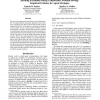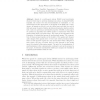63 search results - page 2 / 13 » When Agents Communicate Hypotheses in Critical Situations |
ATAL
2004
Springer
13 years 9 months ago
2004
Springer
In this paper we introduce a model for direct communication in situated multi-agent systems. Direct communication is typically associated with cognitive agents, where the informat...
AAAI
1996
13 years 6 months ago
1996
Previous work suggests that reminding a conversational partner of mutually known information depends on the conversants' attentional state, their resource limits and the reso...
SIGECOM
2004
ACM
13 years 10 months ago
2004
ACM
The revelation principle is a cornerstone tool in mechanism design. It states that one can restrict attention, without loss in the designer’s objective, to mechanisms in which A...
CEEMAS
2003
Springer
13 years 10 months ago
2003
Springer
Agents of a multi-agent system (MAS) must synchronize whenever they want to perform simultaneous actions. In situated MASs, typically, the control over such synchronization is cent...
GECCO
2008
Springer
13 years 6 months ago
2008
Springer
This paper presents a communication-less multi-agent task allocation procedure that allows agents to use past experience to make non-greedy decisions about task assignments. Exper...


